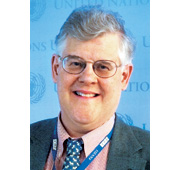Security Council carousel
UNITED NATIONS ― It’s the annual diplomatic ritual when the 193-member U.N. General Assembly elects five of its members to serve for two-year stints on the powerful Security Council. As can be imagined, the competition is intense to gain real political power and the global limelight on the 15-member Council.
The new members are selected by regional geographic groups, while their actual political clout dete
mines the outcome. The new rotating members serve, starting from January, alongside the Permanent Five veto-holding members; Britain, France, People’s China, Russia, and the United States.
In the current round of voting The Republic of Korea, (aka South Korea) won a three-way race for the sole Asian seat. And in the West and European and Others group, known by the awkward acronym WEOG, Luxemburg and Australia edged out Finland for two places. Rwanda won the Africa seat unopposed and Argentina gained the Latin American seat unopposed as well.
South Korea was locked in a three way race for the sole Asian seat. The Himalayan Kingdom of Bhutan and the Southeast Asian Kingdom of Cambodia provided the competition. Tiny and underdeveloped Bhutan held little political leverage whereas Cambodia (whose former King Sihanouk died nearly on the eve of the vote) had the backing of the powerful Association of Southeast Asian Nations (ASEAN). Nonetheless, South Korea won on a second ballot with 149 votes to 43 for Cambodia.
South Korea has become a global player and holds tremendous political capital inside the United Nations system. Secretary General Ban Ki-moon after all is a Korean and the Seoul government is the 11th largest contributor to the U.N. budget. Moreover since the ROK gained U.N. membership in 1991 (as did North Korea too) Seoul has played an active role in both financing and participating in U.N. peacekeeping missions. Few serious observers would doubt Seoul’s credentials to serve on the Security Council.
Moving to the Western European and Others group, Luxemburg and Australia gained the two-year tenure. Both countries were among the U.N.’s founders in 1945 and have played a positive role in the international organization.
Australia’s election with 140 votes is significant because it tilts the Council toward Asia but with a clearly western-oriented country.
The new members replace Germany and Portugal whose two-year tenure now ending, shall be remembered by diplomats as having a strong moral compass and unambiguous commitment to human rights around the world.
As mentioned the African seat was unopposed. Rwanda replaces South Africa on the Council with 148 votes. Though there’s tremendous worldwide sympathy for Rwanda’s humanitarian genocide resulting from the 1990s civil war, the fact remains that the current government in Kigali is widely accused by many human rights organizations as being intolerant to civil, political and media rights.
Argentina gains the Latin American seat unopposed, with an impressive 182 votes, replacing Columbia. As a U. N. founder, Argentina has held non-permanent terms on eight occasions since 1945. Though having participated in many peacekeeping missions, and having a professional diplomatic service, one may ponder what role the government of President Christina Fernandez de Kirchner may wish to play over issues such as the Falkland Islands, disputed with Britain.
So how does the political dynamics and impact of these new Council members look for United States policy?
Starting with Asia, the South Korean tilt is a clear plus. The ROK is a close American ally, treaty partner, and major trading state. Korea replaces India, whose current foreign policy has become more fair and balanced in the last decade. Seoul’s selection will bring more focus to the debate on North Korea’s nuclear ambitions but should not be seen as instinctively following Washington’s lead on issues such as Iran.
For the Western European seats, Luxemburg as an EU and NATO member is a close and longtime American ally. Equally Australia, despite the current Labor government, remains a trusted and true American partner in the Pacific. Thus the rotation from Germany and Portugal will basically not change any balance here.
The African seat tilt from South Africa, a continental powerhouse, to Rwanda may prove problematic. Moreover, it is probably not a plus for U.S. policy.
Equally Argentina’s current leftist government has sadly fallen under the political spell of Hugo Chavez’s Venezuela. This allows the Argentines a platform to push their hyper-nationalist agenda in the Falkland Islands regarding their political face-off with Britain. Given the current government, Argentina’s place at the Council table is not in concert with American interests as was Colombia.
The year ahead sees new players and challenges for the Council. The chips are down. <The Korea Times/John J. Metzler>























































